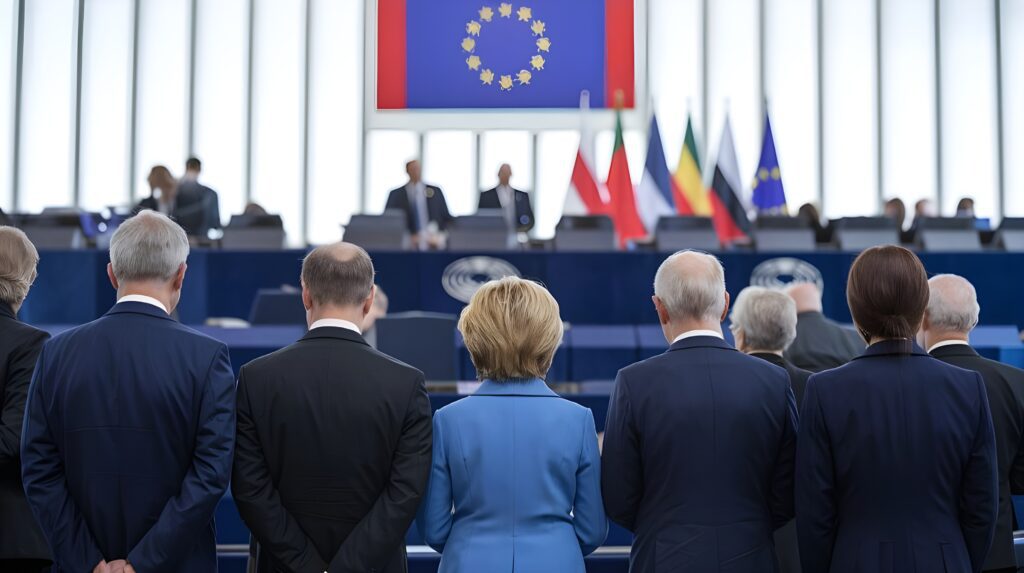The re-election of Donald Trump as President of the United States and the rise of far-right factions in the European Parliament represent a significant shift in global politics that could impact labour rights profoundly.

Rising Right, Shrinking Rights:
The Trump Re-Election and Rise of Far-Right Power in Europe: A Threat to Labor Rights
The re-election of Donald Trump as President of the United States and the rise of far-right factions in the European Parliament represent a significant shift in global politics that could impact labour rights profoundly. Both political movements have favoured deregulation and reduced government intervention, often at the expense of established labour protections. Here, we explore how these developments may reshape labour rights and affect union power across the U.S. and Europe.

Trump’s Labor Policy Legacy and Future Outlook
Donald Trump’s first term marked a series of changes to labour policies that tilted the scales in favour of corporations and employers. Key examples include:
- Narrowing Overtime Eligibility: The Trump administration revised the rules determining which employees qualify for overtime pay, reducing the number of eligible workers and favouring employer savings over worker compensation[1].
- Restricting Collective Bargaining: Trump’s appointees to the National Labor Relations Board (NLRB) made decisions that limited union influence. By weakening the NLRB, the administration hindered union organizing efforts and made it more challenging for workers to advocate for better working conditions[2].
- Federal Employee Rights: One of Trump’s most controversial policies, “Schedule F,” aimed to reclassify federal employees in a way that would strip civil service protections and reduce job security for federal workers[3].
In his second term, Trump has indicated he will continue with similar strategies, advocating for the expansion of “right-to-work” laws that would allow workers to benefit from union negotiations without paying dues. This approach could reduce union funding and make it even harder for labour organizations to support worker rights.
—
[1] Brande is Now, How has the Trump administration changed labour protections? 14 November 2024
[2] New York Magazine, The Real Class War Against Normal People, Sarah Jones, 4 November 2024
[3] Business Today, Problematic…’: Federal workers in America fear mass sackings as Schedule F looms under Donald Trump’s return, 14 November 2024
The Rise of Far-Right Influence in the European Parliament
The 2024 European Parliament elections saw significant gains for far-right parties, with nationalist and anti-immigration platforms attracting widespread support. Notable parties, including France’s National Rally and Hungary’s Fidesz, have strengthened their presence, potentially forming a powerful bloc[1].
- Blocking Progressive Labour Policies: Far-right Members of the European Parliament (MEPs) have a record of opposing policies aimed at improving labour rights, such as minimum wage reforms and stronger worker protections[2].
- Deregulation and Business-Friendly Agendas: These parties often advocate for pro-business agendas, citing the need to reduce bureaucratic hurdles for companies. Such policies, if enacted, could reduce workplace safety standards, increase job insecurity, and undermine labour protections across various sectors.
- Divisive Social Policies: Many far-right parties favour policies that could impact immigrant workers disproportionately, often limiting protections and creating labour divisions that can affect wages and job security for all workers.
—
[1] SWP, Divided But Dangerous: The Fragmented Far-right’s Push for Power in the EU after the 2024 Elections, Max Becker, Nicolai von Ondarza, 1 October 2024
[2] European Economic and Social Committee, Unmasking the far right’s anti-worker agenda, 2024


Global Implications for Labor Rights
The political convergence of far-right movements in both the U.S. and Europe raises concerns for global labour standards. Potential risks include:
- Deregulation Leading to Lower Standards: If both regions embrace deregulation, workplace standards such as occupational safety, minimum wage laws, and anti-discrimination policies could be weakened, with corporations prioritizing cost-cutting over worker welfare.
- Reduced Union Power and Collective Bargaining: Unions play a vital role in advocating for labour rights, but anti-union policies could erode collective bargaining. Lower union membership often correlates with fewer benefits, lower wages, and less favourable working conditions for employees.
- Stagnation of Labor Reforms: Legislative progress on labour rights, such as paid family leave or anti-discrimination measures, may stall or regress in the face of far-right opposition.
Unions under fire!
How These Political Shifts Affect Trade Unions
These developments may weaken unions’ ability to advocate for workers’ rights, negotiate fair wages, and protect working conditions:
Legal and Regulatory Constraints on Unions
Far-right political leaders in both the U.S. and Europe have supported policies that restrict union power by limiting legal protections and cutting off resources.
- In the U.S.: Trump’s push for expanding “right-to-work” laws exemplifies how these policies undermine unions. Right-to-work laws allow workers to benefit from union contracts without paying dues, reducing union funds and making it harder for unions to operate effectively[1].
- In Europe: The European far-right frequently advocates for deregulation to promote “business-friendly” environments, often at the cost of labour protections (European Trade Union Institute). This trend could make it harder for unions to secure collective bargaining rights and uphold labour standards across the EU.
Reduced Collective Bargaining Power
Policies favouring corporations over workers weaken unions’ negotiating power, impacting wages, benefits, and job security.
- Impact on Wages and Benefits: Studies show that when union influence declines, worker pay and benefits also suffer. For example, unionised workers typically enjoy better pay and health benefits than their non-unionized counterparts[2]. Anti-union legislation threatens to erode these gains, particularly in sectors where collective bargaining is vital for securing fair wages and working conditions.
- Sector-Specific Challenges: Far-right parties in Europe often prioritise certain sectors, like manufacturing, over others, such as social services or the gig economy. This selective support fragments union efforts and makes it harder to protect vulnerable workers across different industries.
Constraints on Union Organising Efforts
In the following years, increased regulatory barriers and surveillance measures can make union organising efforts more challenging.
- Increased Oversight and Restrictions: Anti-union policies can make it harder for unions to operate, especially in the public sector. Trump’s Schedule F order, for instance, aimed to reduce union protections for federal employees, limiting their ability to organise[3].
- Barriers to Unionising New Sectors: As the economy shifts to more freelance and gig work, unions need to adapt to protect these workers. However, far-right parties generally oppose expanding union coverage to these areas, citing economic flexibility and employer costs.
—
[1]Communications Workers of America, Trump’s Anti-Worker Record, undated.
[2] Axios, There’s a big wealth gap between union and non-union workers, Emily Peck, 20 March 2024.
[3] Federal News Network, Trump’s promise to revive Schedule F could become a ‘prompt’ reality, Drew Friedman, 8 November 2024.
GIG WORKERS EXPLAINED
Gig workers are individuals who engage in short-term, flexible jobs rather than traditional, long-term employment arrangements. This type of work is commonly part of the gig economy, which includes freelance, contract, or on-demand work that often lacks the benefits and protections of full-time employment. Gig work typically involves digital platforms or apps, like Uber, Lyft, TaskRabbit, and Upwork, where workers are connected with clients or customers for individual tasks or services.

Public Perception and Political Influence
Far-right narratives often portray unions as part of a “left-wing agenda,” which can affect public support for unions and influence political priorities.
- Polarised Public Perception: Far-right parties frequently position unions as political actors aligned with progressive agendas, which can erode support among workers who may benefit from union representation but are sceptical due to political affiliations.
- Political Pressure on Union-Friendly Legislation: With more far-right representation, legislative support for pro-union policies may decline. Far-right politicians typically resist policies that protect unions, such as raising the minimum wage or supporting collective bargaining rights.
Potential Loss of International Solidarity
Trade unions often rely on cross-border collaboration to strengthen their influence and coordinate efforts on global labour standards. However, the rise of nationalist policies can strain these relationships.
- Reduced Cross-Border Solidarity: Nationalist policies promoted by far-right parties focus on local, rather than international, labour concerns. This makes it challenging for unions to form global alliances and advocate for workers across borders.
- Reduced Influence in EU Labour Policy: Far-right influence in the European Parliament could also obstruct EU-wide labour regulations, fragmenting the labour movement within Europe and weakening unions’ ability to present a unified stance on labour issues.
The Next Moves: Confronting the Far-Right Wave
To counteract the pressures and challenges posed by far-right policies in the U.S. and Europe, trade unions, can adopt several strategies to strengthen their influence, mobilise public support, and protect workers’ rights in an increasingly hostile political environment:
Modernise Organising Techniques to Adapt to New Work Models
As gig and freelance work continues to grow, unions can expand their membership and influence by adopting flexible, digital-first organising strategies that engage younger, non-traditional workers.
- Digital Organising and Outreach: Adopting digital tools, such as online campaigns, virtual town halls, and membership drives via social media, allows unions to reach workers in remote, freelance, and non-standard employment settings. For example, the Service Employees International Union (SEIU) has successfully used digital campaigns to advocate for gig workers’ rights (Wired).
- Targeting New Sectors: Unions should expand their focus to include gig economy sectors, where labour protections are minimal and union representation is rare. Union Syndicale could also work within EU institutions to encourage the adoption of policies that allow gig workers to organize and collectively bargain.
Strengthen International Solidarity and Cross-Border Collaboration
Far right and nationalist rhetoric often emphasises local priorities, but unions can counteract this by fostering international solidarity to build a stronger, unified front.
- International Campaigns and Partnerships: Unions can strengthen relationships with international labour organizations, to coordinate cross-border advocacy. Collaborative campaigns can help amplify worker concerns and apply pressure to uphold labour standards, even when domestic policies are challenging.
- Support for Migrant and Seasonal Workers: Nationalist policies often target migrant labour, and unions can push back by advocating for migrant workers’ rights, emphasising their role in the economy and supporting policies for fair treatment across borders.

Build Broader Public Support for Union Goals and Worker Rights
To combat anti-union sentiment, unions can increase transparency, provide education on their role, and build public support through community and media engagement.
- Public Awareness Campaigns: By launching public campaigns that educate workers and the broader public about the importance of unions, labour protections, and fair wages, unions can counter negative narratives and gain support from non-unionised workers. The AFL-CIO, for instance, runs campaigns that highlight the role of unions in achieving fair working conditions for all.
- Targeted Media Outreach: Union Syndicale and other unions can use media platforms to advocate for workers’ rights and counter far-right misinformation about unions. Stories that humanise the struggles of workers and highlight union successes can foster a more positive public perception.
Lobby for Pro-Union Policies and Forge Cross-Party Alliances
Political lobbying and building alliances with moderate and centre and left-leaning parties can help unions push for policies that protect labour rights, even amid a conservative or far-right majority.
- Pro-Union Legislation and Policy Support: Unions should lobby for labour-friendly policies at the EU level, such as strengthening the European Pillar of Social Rights. By working with allies in the European Parliament, they can advocate for EU-wide standards that protect worker rights across all member states (European Commission on the European Pillar of Social Rights).
- Building Cross-Party Coalitions: In national and EU parliaments, unions can build alliances with moderate center-right or centrist parties that value labour protections and social stability, creating bipartisan support for pro-labour policies. (Brussels Labour).
Protect and Strengthen Collective Bargaining Rights
Collective bargaining remains one of the most powerful tools for unions, and protecting these rights is essential for maintaining union influence and improving working conditions.
- Defend Collective Bargaining in Legislation: Unions should work to enshrine collective bargaining rights into national and EU labour laws to protect against efforts to weaken these rights through deregulation. This includes opposing “right-to-work” laws in the U.S. and advocating for strong labour protections within EU member states.
- Innovative Bargaining Strategies: Unions could explore sectoral or industry-wide bargaining strategies, where collective agreements apply across an entire sector, ensuring that more workers benefit from negotiated protections even in industries where union membership is low.
Advocate for Inclusive Policies that Address Nationalist and Anti-Worker Agendas
Far-right policies often discriminate against certain worker groups, and unions can counter these agendas by advocating for inclusive, equitable labour policies.
- Support for Anti-Discrimination Measures: Unions should support policies that protect vulnerable workers, including immigrants, women, LGBTIQ and minorities, who are often disproportionately affected by nationalist and anti-worker legislation. Unions could promote inclusive labour policies that protect diverse workforce groups across the EU (European Commission Anti-Discrimination Policies).
- Economic Arguments for Fair Labor Practices: Presenting evidence that fair labour practices contribute to a stable and productive workforce can counter anti-union arguments. Studies show that countries with strong labour protections have more robust economies, lower turnover rates, and higher productivity[1].
—
[1] Harvard Law Review, On Constructing a Stronger Right to Strike Through Comparative Labor Law, David J. Doorey, 4 January 2024
Conclusion
The rise of far-right political influence in the U.S. and Europe presents significant challenges to labour rights, union power, and worker protections. Policies favouring deregulation, anti-union sentiment, and the prioritisation of corporate interests risk eroding the hard-won gains that workers and unions have achieved over decades. Trade unions, facing political and regulatory pressures, must adapt by modernising their organising efforts, fostering international solidarity, and building alliances across political divides. Protecting labour rights in this shifting landscape will require strong public support, innovative approaches, and a commitment to inclusive policies that champion fair wages, job security, and equitable treatment for all workers. As unions rise to meet these challenges, their continued advocacy will be crucial to safeguarding the rights and dignity of workers in an increasingly polarised world.

Isidoros TSOUROS
About The Author
Isidoros Tsouros assumed the role of Research Assistant at EUAA in 2019.
With over 25 years of experience as a legal professional, he has had a distinguished career, being elected as the President of a Greek Law Bar Association on two occasions.
In 2022, he was elected to the USB Executive Committee as a representative from the Agencies Section. Since May 2024 he is the Chair of the EUAA Staff Committee.
This article reflects his trade-union perspective and is written in that capacity.